The Ipsos MORI Issues Index for February 2017 is fascinating.
Start with migration where concern is collapsing after the hype of the referendum:
If that trend continues this will be going below long term trend quite soon.
Brexit is moving in the opposite direction:
This is now off all known previous scales. And very clearly the matter is not settled or concern would not be rising. People are realising the mess we're in.
At the same time concern on the economy is down:
That is complacency before a storm, I think.
And then there is unemployment:
That looks like more evidence of complacency before a storm.
The government may not be in for a totally easy time. This is NHS concern:
That jump is a sign of trouble coming. Concern in poverty and inequality says much the same thing:
I think that's a clear sign that austerity is reaching its limits. Housing is showing the same trend:
But concern ion inflation is rightly low meaning the capacity to spend exists in the public mind:
A good opposition could turn all this to considerable advantage.
Thanks for reading this post.
You can share this post on social media of your choice by clicking these icons:
You can subscribe to this blog's daily email here.
And if you would like to support this blog you can, here:

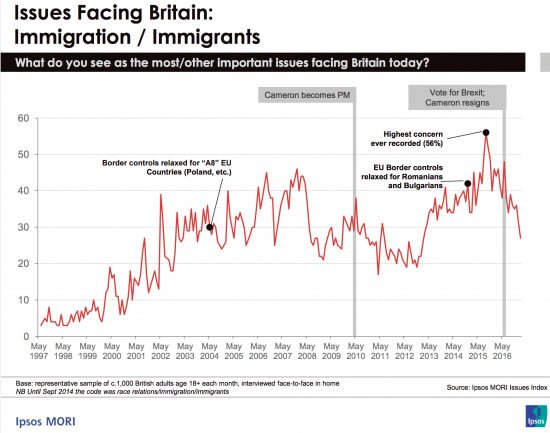
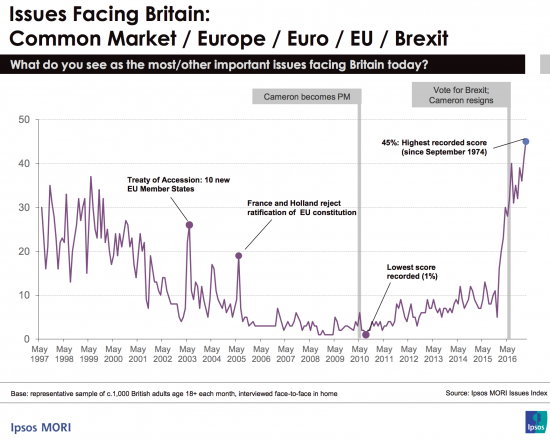
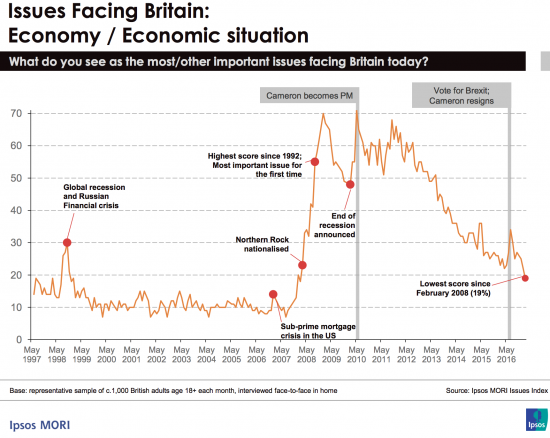
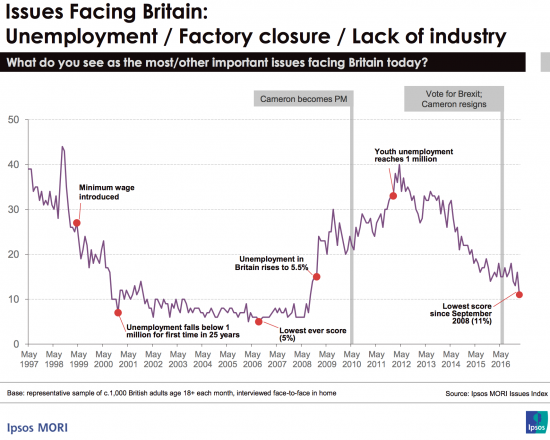
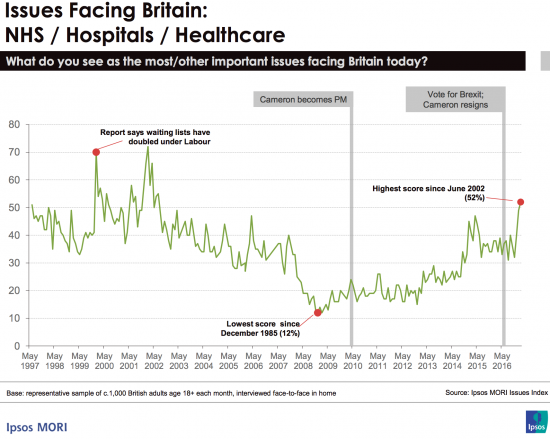
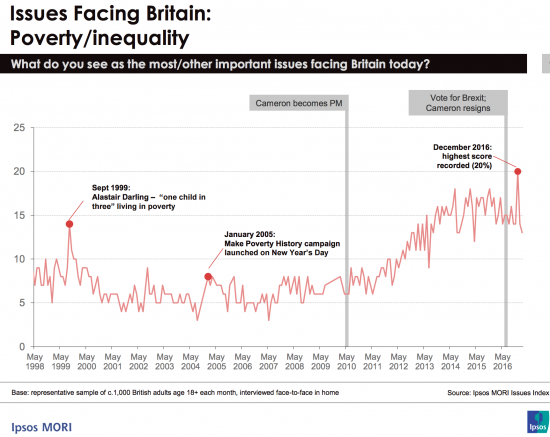
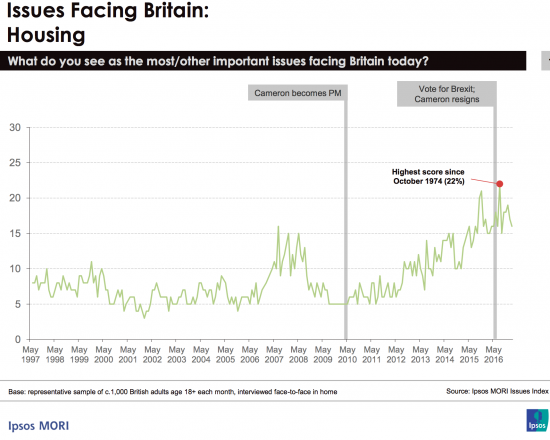
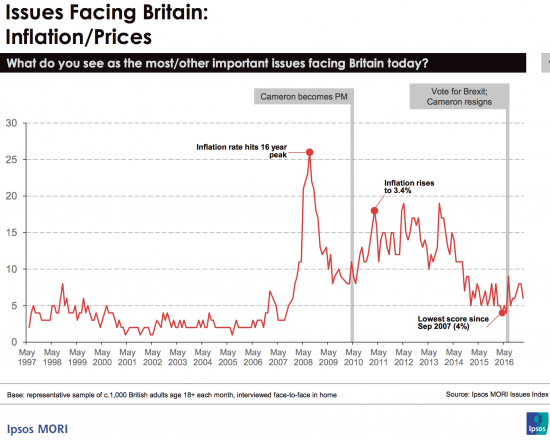


Richard, it would be very interesting to see a longer timeseries for immigration concern. The current timeseries starts at 97 when Labour come into power with very low levels of concern. Concern then increases continually throughout the Labour period of government and further on due to the Brexit referendum. My hunch would be that a Tory opposition party and their supporting press will fall back on banging the immigration drum in periods of opposition thus driving up concern regardless of whether the evidence shows there is anything to be concerned about.
You can see a similar pattern with concern about the NHS. In the period of Labour government the levels of concern show a strong overall downward trend. Then Labour get kicked out and when in opposition rely heavily on banging the NHS drum which leads to increases in concern.
Just like is seen with the fear of crime. The level of concern in the population can be wildly different to what the statistical evidence shows it should be.
Last point accepted
I suspect there are longer tern data sets
The day job will prevent me finding them
I take your point Rick, but presently the NHS is being dismantled and run down in front of our eyes.
Even so, it doesn’t seem ( to me ) to be a hot issue politically.
I am going to a demonstration in support of the NHS tomorrow ( Saturday ). I will be taking one of the seats that Unison didn’t manage to fill with their members on the one coach stopping by in my town ( population 250 000 ).
I thought we had disproved the even vague accuracy of polls
Look at the trend – it seems pretty logical
I have to agree with some of the more sceptical comments here.
Some of the more enthusiastic Tory voters I know of are complaining about the proposed rise in business tax rates.
But as soon as the local paper mentions this, the blame shifts to the imagined incompetence of whatever the local party is running the Council who has to implement it – never mind who is in Government instigating it.
I’m not sure that everyone knows that the proposed business rate rises are coming from May(hem) and Co. I just hope that the local Tory politicians voices against this grow louder.
Where your blog gains credence (and sceptics here please take note) is that we are beginning to see tensions between Westminster Tories and local government Tories opening up. This signals to me that ‘Westminster centre’ is out of step with the regional areas – philosophically and democratically. It also demonstrates the iron grip that neo-liberalism has on Westminster Tories. But make no mistake – this is causing trouble with the Tory Party and more could be made of it by the opposition.
Maybe this is why May has had a go at the Scots recently – whipping up some anti-Scot fervour (in the presence of what is left of the Scots Tories) to draw people’s attention away from what she is actually up to.
I have come to the conclusion lately that the average Tory (whether a politician or voter) is someone who hates their country and looks to blame others for its perceived failings. We hear of the Left and Marxists and Trots’ but it seems to me that the biggest bunch or reactionaries are the Tory party itself.
Additionally, they seem to want to paint a picture of this kingdom of ours being a major power (now based on handling money and nothing else it seems) of some sort and are willing to sacrifice anything to do this.
May needs t fight Scots like Corbun does many in Labour
Bith think these fights show them in a good light
Bith think they can win them
They can’t
“I have come to the conclusion lately that the average Tory (whether a politician or voter) is someone who hates their country and looks to blame others for its perceived failings. We hear of the Left and Marxists and Trots’ but it seems to me that the biggest bunch or reactionaries are the Tory party itself.”
Well, for a bunch of people who love to wrap themselves in the union jack flag, it is curious how much they dislike/hate/criticise/denigrate and generally wreck great British institutions like the NHS, BBC, Welfare State, etc etc. Most of the right these days just have a craven admiration for the crude Social Darwinian 19C brand of thinking coming from the American right.
Additionally, as we see in the case of Ukip, many of them are essentially highly unpleasant liars and egoists who see everything only in terms of their own self interest.
Agree with all that
Looks like West Somerset is going to get up to a 65% rise in some biz rates. Never mind losing the EU funding as well!
My apologies for the URL!
https://order-order.com/2017/02/20/read-business-rates-changes-constituency/